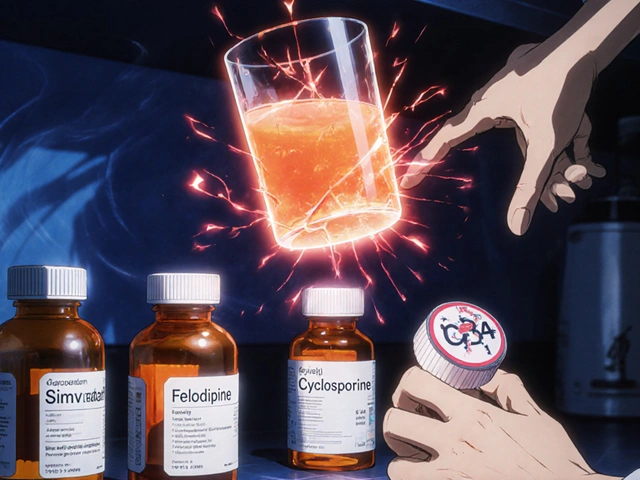Introduction: Alcohol and Folate Deficiency
As a blogger who is passionate about health and wellness, I've always been curious about the effects of alcohol consumption on our bodies. One topic that has caught my attention is the connection between alcohol consumption and folate deficiency. In this article, I will explore this connection in depth, discussing the role of folate in our bodies, the impact of alcohol on folate absorption, and the potential consequences of this deficiency.
The Importance of Folate in Our Bodies
Folate, also known as vitamin B9, is an essential nutrient that plays a crucial role in many biological processes. It is vital for the synthesis of DNA and RNA, which are the building blocks of our genetic material. Folate is also necessary for the formation of red and white blood cells, the metabolism of amino acids, and the production of neurotransmitters that regulate our mood, sleep, and appetite.
Our bodies cannot produce folate on their own, so we must obtain it from our diet. Rich sources of folate include leafy green vegetables, legumes, and fortified cereals. The recommended daily intake of folate varies depending on age, sex, and life stage, but in general, adults should consume around 400 micrograms of dietary folate equivalents per day.
Alcohol's Impact on Folate Absorption and Metabolism
Alcohol consumption can negatively affect our body's ability to absorb and utilize folate. When we drink alcohol, it is broken down into acetaldehyde, a toxic substance that interferes with the absorption of folate in the small intestine. This can lead to a reduction in the amount of folate available for our bodies to use.
Furthermore, alcohol can impair the metabolism of folate in the liver, where it is converted into its active form, 5-methyltetrahydrofolate. This active form is necessary for many of the functions that folate performs in our bodies. By disrupting the conversion of folate into its active form, alcohol can further contribute to a deficiency in this essential nutrient.
Signs and Symptoms of Folate Deficiency
Folate deficiency can manifest in a variety of ways, depending on the severity and duration of the deficiency. Some common signs and symptoms include:
- Fatigue and weakness
- Difficulty concentrating and irritability
- Headaches and dizziness
- Shortness of breath and heart palpitations
- Sores in the mouth and on the tongue
- Changes in skin, hair, and nail color and texture
It is essential to recognize these symptoms and consult a healthcare professional if you suspect that you may be experiencing a folate deficiency.
The Link Between Alcohol and Anemia
One of the most well-known consequences of folate deficiency is anemia, a condition in which the body does not have enough healthy red blood cells to transport oxygen to its tissues. Folate is necessary for the production of red blood cells, so a deficiency can lead to a decreased production or an increase in the destruction of these cells.
Alcohol consumption can contribute to anemia in several ways. In addition to impairing folate absorption and metabolism, alcohol can also suppress bone marrow function, which is responsible for producing red blood cells. This can result in a form of anemia known as alcohol-associated anemia.
Neurological Effects of Folate Deficiency
Beyond its impact on red blood cell production, folate deficiency can also have detrimental effects on our brain and nervous system. Folate is necessary for the synthesis of neurotransmitters, such as serotonin, dopamine, and norepinephrine, which play crucial roles in regulating our mood, sleep, and cognitive function.
Studies have shown that individuals with low folate levels are at an increased risk of developing depression, anxiety, and other mood disorders. Additionally, a deficiency in folate can contribute to cognitive decline and memory impairment, particularly in older adults.
Pregnancy Complications Associated with Folate Deficiency
Folate deficiency during pregnancy can have severe consequences for both the mother and the developing fetus. Adequate folate intake is crucial for preventing neural tube defects, such as spina bifida and anencephaly, in the unborn child. Pregnant women who consume alcohol are at a higher risk of having a child with a neural tube defect due to the impaired absorption and metabolism of folate.
Furthermore, a deficiency in folate during pregnancy can increase the risk of other complications, such as premature birth, low birth weight, and miscarriage. It is essential for pregnant women to ensure they are getting enough folate, either through their diet or by taking a prenatal vitamin containing folic acid, the synthetic form of folate.
The Role of Genetics in Folate Deficiency
It is important to note that genetics can play a role in an individual's susceptibility to folate deficiency. Certain genetic variations can affect how our bodies absorb and metabolize folate, making some people more prone to deficiency than others.
One such example is the MTHFR gene, which is responsible for converting folate into its active form, 5-methyltetrahydrofolate. Individuals with certain mutations in this gene may have a reduced ability to convert folate, which can lead to a deficiency even in the absence of alcohol consumption. In these cases, supplementation with the active form of folate, known as L-methylfolate, may be necessary.
Preventing Folate Deficiency: Diet and Supplementation
One of the most effective ways to prevent folate deficiency is to ensure that you are consuming a diet rich in folate-containing foods. These include leafy green vegetables, legumes, and fortified cereals. Additionally, some individuals may benefit from taking a folic acid supplement, particularly if they are at an increased risk of deficiency due to factors such as alcohol consumption, pregnancy, or genetic predisposition.
It is essential to consult with a healthcare professional before starting any supplementation regimen, as excessive folic acid intake can mask the symptoms of other deficiencies, such as vitamin B12 deficiency, and lead to further complications.
Reducing Alcohol Consumption for Better Folate Levels
Given the impact of alcohol on folate absorption and metabolism, reducing alcohol consumption is a key strategy for preventing folate deficiency. Limiting or abstaining from alcohol can help ensure that your body is able to properly absorb and utilize this essential nutrient, promoting overall health and well-being.
If you are struggling with alcohol addiction or dependency, seeking professional help and support from a healthcare provider, therapist, or support group is crucial for overcoming this obstacle and improving your overall health.
Conclusion: The Importance of Folate and Responsible Alcohol Consumption
In conclusion, there is a clear connection between alcohol consumption and folate deficiency. Alcohol can impair the absorption and metabolism of this essential nutrient, leading to a range of health problems, including anemia, neurological issues, and pregnancy complications. By ensuring that we consume a diet rich in folate, considering supplementation when necessary, and practicing responsible alcohol consumption, we can support our overall health and prevent the negative consequences of folate deficiency.








Comments
Hey everyone, it's so great to see folks taking charge of their health!!! Adding a leafy green salad to your dinner is a quick win, and you’ll feel the boost in energy almost instantly!!! Remember, every small step-like swapping a sugary drink for a glass of orange juice fortified with folic acid-counts toward better folate levels!!! Keep the momentum going, and celebrate each nutritious choice as a victory!!!
I get how hard it can be to cut back on drinks some people just dont notice the hidden loss of nutrients
Yo, if you’re juggling work and social drinks, try sneaking a smoothie with spinach and banana before you head out-your body will thank you later. It’s a low‑key hack that adds folate without any drama. Plus, staying hydrated with water helps your liver process alcohol more efficiently.
The hepatic first‑pass metabolism of ethanol evidently impairs the methylation cycle, precipitating a functional folate deficiency.
Building on that point, the interplay between acetaldehyde accumulation and reduced 5‑methyltetrahydrofolate availability creates a feedback loop that can exacerbate megaloblastic anemia in chronic drinkers.
When we sip a glass of wine, we’re not just tasting terroir, we’re also inviting a silent chemistry that meddles with our DNA’s backup crew.
Folate, the humble B‑vitamin, serves as the unsung archivist, copying genetic scripts with precision.
Alcohol, however, acts like a clumsy editor, scattering edits across the manuscript of our cells.
The metabolite acetaldehyde binds to folate receptors, reducing the gut’s ability to usher this vitamin into circulation.
Over time, the depleted folate pool compromises the synthesis of purines and thymidine, the building blocks of new blood cells.
The body compensates by pushing out immature erythrocytes, which explains the macrocytic anemia seen in heavy drinkers.
Beyond the blood, the nervous system feels the fallout, as neurotransmitter pathways starve for the methyl groups that folate normally supplies.
A deficiency can dim the glow of serotonin, leaving mood swings and cognitive fog in its wake.
Pregnant individuals face an even steeper hill, because the developing neural tube relies on a steady stream of folate to close properly.
Studies have shown that even moderate alcohol intake during the first trimester can double the risk of spina bifida.
Genetics adds another layer, with MTHFR polymorphisms making some people especially vulnerable to these disruptions.
For those carriers, supplementing with L‑methylfolate rather than plain folic acid may bypass the bottleneck.
Practical steps involve rotating alcoholic beverages with folate‑rich snacks like edamame, lentils, or fortified oats.
Hydration with electrolyte‑balanced water can also lessen acetaldehyde’s sting on the intestinal lining.
Ultimately, the choice to moderate or abstain is a personal calculus, but knowing the biochemical stakes empowers smarter decisions.
Great breakdown! Your point about L‑methylfolate really hits home for those with MTHFR variants-personalized supplementation is the next frontier.
It is imperative to note that chronic ethanol intake disrupts the enterohepatic circulation of folate; consequently, the reduction in serum folate concentrations predisposes individuals to macrocytic anemia, neurocognitive deficits, and adverse pregnancy outcomes.
But the data isn’t as black‑and‑white; some studies fail to find a direct causal link, so the whole “alcohol = folate disaster” narrative feels a bit over‑hyped.
Cutting drinks sharpens focus.
In light of the evidence presented, I would respectfully recommend that individuals who consume alcohol on a regular basis consider periodic screening of their serum folate levels, thereby enabling timely nutritional interventions.
yeah, a quick blood test ain’t hurt, just dont overthink it.
The shadow of deficiency looms long over those who ignore the subtle signs, and the silence of neglect can be deafening.
Neglecting folate is a choice; the consequences are predictable and preventable with minimal effort.
Adding a daily multivitamin with 400 µg of folic acid can be a simple safety net for anyone who isn’t sure about their diet.
That’s a sensible suggestion, especially for those juggling busy schedules and occasional socials.
While supplements are helpful, the most reliable source remains whole foods like spinach, beans, and fortified grains, which also provide fiber and antioxidants.
In the grand scheme, one could argue that the pursuit of perfect nutrient balance is a philosophical mirage, yet the practical reality demands at least a baseline of folate to keep the mind from wandering into existential fog.